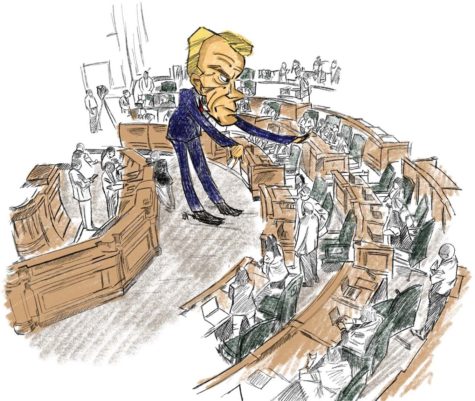A Broke Illinois
What happened during the budget crisis and what’s next for the state?
On July 6, Illinois legislators passed a budget for the state in the first time in two years by overriding Gov. Bruce Rauner’s veto. The damage? Over $14.6 billion in unpaid bills, thousands of laid off workers, hundreds of cancelled projects, and several universities with junk credit.
The effects of a budgetless Illinois is long standing and the consequences are tremendous. Students attending UIS in Spring 2017 can
remember the teacher strikes around finals when faculty desperately implored the government to pass a budget. The university administration flooded students with e-mails about the current strike and assured that grants normally be offered to students would be paid by UIS should the government be unable to get a budget in time.
Unfortunately, many students and professors from other universities weren’t as lucky.
“We have witnessed an out-migration of skilled professors from our institutions of higher learning due to this uncertainty,” said Illinois State Representative Steve Anders. “That is not something that can just be reversed. Additionally, we lost approximately 72 thousand students net from our public universities. Those students aren’t coming back.”
But the damage doesn’t just affect universities. Hospitals, among other health care providers, were wounded during the two-year impasse as well. Many hospitals have racked up debt ranging from thousands to even billions of dollars. Thousands of people have gone without often lifesaving treatments–especially. Its unimaginable how many people are without treatment because of the two-year silence.
The standstill stemmed from disagreements over proposed budget plans. While the Democrats wanted tax increases, Rauner refused unless it included an increase of reforms within the budget– something that Democrats didn’t want to sign for. Some of his proposed reformed included politician term limits, returning income tax rates to 3 percent, and restructuring collective bargaining issues.
The actual passage of the budget marked a rare moment of party solidarity, where Republican legislators were able to go against their own governor. In total, 16 Republicans (15 from the House, 1 from the Senate) broke with the party and voted for the budget package, possibly saving the state from the brink of fiscal collapse.
Had those Republicans not broken away from Rauner, Illinois faced a credit rating of junk status, which would multiply its deficit and force taxpayers to pay more for basic needs and services provided by the state government.
Overall, the stalemate was a political loss for Rauner and may harm his chances of being reelected as governor in 2018. After consistently turning down budgets, many columnists placed the whole blame of the budget crisis on the governor. According to the Morning Consult, Rauner had a 49 percent disapproval rating as of July 18. This places him in the top 10 most disliked governors nationwide.
The new budget instituted a permanent income tax increase, leaving many of Rauner’s hopes for reform out in the cold.
Possibly trying to regain some early campaign momentum, Rauner quickly dumped most of his former administration, trying to quickly replace them with new faces. After the budget passed, Rauner began replacing, firing, and accepting letters of resignations in preparation for the upcoming election. In addition, the GOP House floor leader Steve Andersson was demoted and Senate Minority Leader Christine Radogno resigned from her position. Radogno had previously helped lead a “Grand Bargain” that would have resolved the stalemate had Rauner not let it slip through.
Of course, the real loser of the budget crisis is the state itself. Because, even though we have a budget now, it will take a long time to recover from the harm of the two-year impasse.
“It will take years— multiple 365 days—to pay that off,” said Republican State Rep. David Harris, who voted in favor of the budget deal.
When asked how long it will take Illinois to recover from the two years without budget, he noted the odds of a quick recovery were low.
“In my opinion, to stabilize our budget and get rid of back bills it will take a minimum of five to six years and that assumes that we don’t overspend revenue to a year to year basis and have a balance budget for the next five to six years.”





